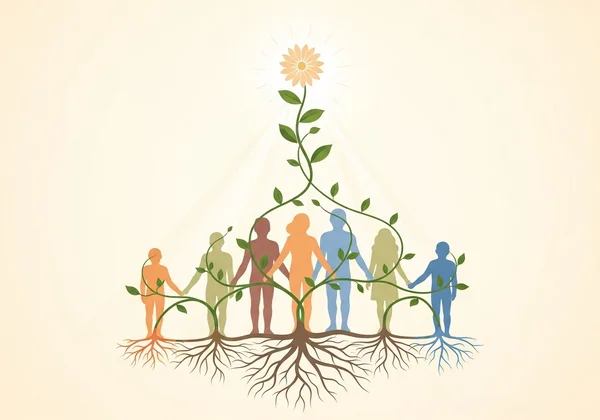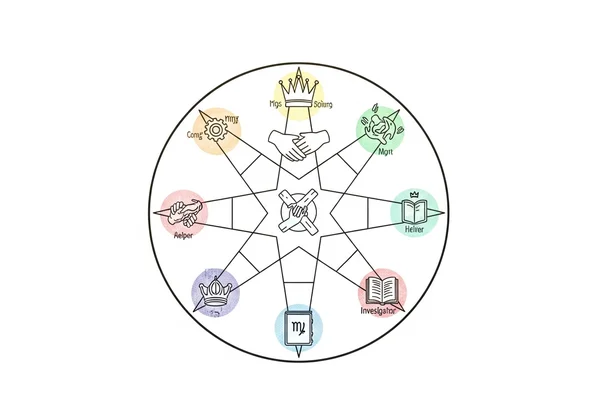Enneagram Test: Discover Your 9 Personality Types & Motivations
July 13, 2025 | By Seraphina Croft
Have you ever wondered what truly drives your actions and reactions, both consciously and unconsciously? What is the Enneagram test? It's a powerful framework for self-discovery, gently uncovering your deepest motivations, hidden fears, and true desires. Understanding your Enneagram personality type can unlock profound insights into yourself and others, guiding you toward personal growth and deeper understanding. If you're ready to embark on this insightful journey, consider starting with a free, insightful assessment available at take the test now.
The Enneagram Explained: Understanding Core Motivations
The Enneagram is more than just another personality typology. It's a dynamic system that delves into the deeper psychological structure of human beings, revealing the core motivations that shape our perspectives and behaviors. Unlike systems that focus solely on traits, the Enneagram illuminates why we do what we do.

What is the Enneagram Personality System?
The Enneagram personality system is an ancient wisdom tradition that describes nine distinct personality types, each represented by a point on a nine-pointed diagram. Each type is defined by a fundamental belief about how the world works and what is necessary to survive and thrive. This core belief gives rise to a particular set of coping mechanisms, strengths, and challenges. It's important to remember that the Enneagram doesn't "box you in" but rather offers a starting point for understanding your unique inner landscape. It helps us see the unconscious patterns that might be holding us back.
Why Exploring Your Enneagram Type Matters for Growth
Understanding your Enneagram type is a powerful catalyst for personal growth. When you recognize your core motivations and underlying fears, you can begin to make conscious choices rather than reacting instinctively. This knowledge empowers you to leverage your strengths, address your blind spots, and improve relationships. For individuals, it can lead to greater self-acceptance and a clearer path to fulfillment. For teams and leaders, it provides a framework for enhancing communication and collaboration. The insights gained from an online Enneagram test can be transformative, helping you navigate life with more intention and empathy.

Delving Deep into the 9 Enneagram Types
Each of the nine Enneagram types offers a unique lens through which to view the world. While we all share common human experiences, our primary type highlights a particular set of preoccupations and inner struggles. By exploring these 9 Enneagram types, we gain a richer appreciation for the diversity of human experience and begin to see ourselves and others with more compassion.

Type 1: The Reformer – Purpose, Principles, and Growth
Known as The Reformer, The Perfectionist, or The Idealist, Type Ones are principled, purposeful, and self-controlled. At their core, they long for goodness, integrity, and being right. Their deepest apprehension revolves around being corrupt, evil, or flawed. Healthy Ones are wise, discerning, and ethical, working to improve the world around them. Unhealthy Ones can be overly critical, judgmental, and rigid. Their growth path involves learning to accept imperfections in themselves and others, embracing flexibility, and understanding that goodness is inherent, not something to be constantly strived for.
Type 2: The Helper – Connection, Care, and Challenges
Twos are warm, generous, and people-pleasing, often referred to as The Helper or The Giver. At their heart, Twos yearn to be loved and appreciated. Their deepest fear is being unwanted or unlovable. When healthy, Twos are truly altruistic, empathetic, and supportive, fostering deep connections. When unhealthy, they might become manipulative or intrusive, seeking to gain affection by meeting others' needs at the expense of their own. For Twos, inner work focuses on recognizing their own needs, setting healthy boundaries, and practicing self-care without guilt.
Type 3: The Achiever – Success, Image, and Development
Threes, also called The Achiever, The Performer, or The Motivator, are adaptable, ambitious, and image-conscious. They are driven by a need to feel valuable and admirable. Their deepest fear is being worthless or a failure. Healthy Threes are confident, inspiring, and capable, often excelling in their chosen fields. Unhealthy Threes can be deceptive or overly focused on external validation, blurring the lines between their true self and their presented image. Their development involves connecting with their authentic feelings and realizing their inherent worth, independent of their accomplishments.
Type 4: The Individualist – Uniqueness, Emotional Depth, and Inner Work
Fours are expressive, creative, and emotionally honest, known as The Individualist or The Romantic. Their underlying yearning is to discover their unique identity and significance. They dread being without identity, feeling insignificant, or deeply flawed. Healthy Fours are deeply empathetic, intuitive, and highly creative, bringing beauty and meaning to the world. Unhealthy Fours can be melancholic, self-absorbed, and prone to feeling misunderstood. Their inner work centers on embracing their unique emotional landscape without dwelling on perceived deficiencies and finding balance between their rich internal world and external reality.
Type 5: The Investigator – Knowledge, Autonomy, and Integration
Fives, often called The Investigator, The Observer, or The Thinker, are insightful, analytical, and self-sufficient. At their essence, Fives seek to be capable and competent. Their deepest apprehension is being useless, helpless, or overwhelmed. Healthy Fives are visionary, wise, and innovative, sharing their vast knowledge to benefit others. Unhealthy Fives can withdraw, become detached, and hoard resources (including time and energy) to avoid being drained. Their integration involves engaging more fully with the world and people, sharing their insights, and realizing that resources are not as scarce as they perceive.
Type 6: The Loyalist – Security, Trust, and Courage
Sixes are committed, responsible, and anxiety-prone, known as The Loyalist, The Guardian, or The Questioner. They seek support and security above all else. Their primary fear is being without guidance, support, or safety. Healthy Sixes are courageous, loyal, and excellent problem-solvers, anticipating issues and building strong alliances. Unhealthy Sixes can be suspicious, defensive, and perpetually worried. Their courage is found in trusting their own inner guidance, facing fears, and recognizing that true security comes from within, not solely from external sources.
Type 7: The Enthusiast – Adventure, Joy, and Self-Restraint
Sevens are spontaneous, optimistic, and versatile, often referred to as The Enthusiast, The Adventurer, or The Epicure. Their central drive is to experience happiness and satisfaction. They fear being deprived, trapped, or experiencing pain. Healthy Sevens are joyful, appreciative, and highly productive, using their energy to uplift others. Unhealthy Sevens can be impulsive, scattered, and avoid pain through constant distraction or excessive indulgence. Their path to self-restraint involves embracing the present moment, sitting with discomfort, and finding deeper fulfillment beyond superficial experiences.
Type 8: The Challenger – Power, Protection, and Vulnerability
Eights are confident, decisive, and protective, known as The Challenger, The Leader, or The Protector. At their core, Eights are driven to protect themselves and their inner circle. Their greatest apprehension is being controlled, harmed, or vulnerable. Healthy Eights are magnanimous, just, and inspiring leaders, using their strength to empower others. Unhealthy Eights can be confrontational, domineering, and seek control to avoid feeling weak. Their journey toward vulnerability involves softening their edges, allowing themselves to trust, and recognizing that true strength includes openness and genuine connection.
Type 9: The Peacemaker – Harmony, Acceptance, and Assertiveness
Nines are accepting, trusting, and agreeable, often called The Peacemaker, The Mediator, or The Harmonizer. They long for inner stability and peace of mind. Their primary fear is loss of connection, conflict, or separation. Healthy Nines are deeply unifying, supportive, and grounded, bringing people together. Unhealthy Nines can be passive, complacent, and merge with others to avoid conflict, losing touch with their own desires. Their development focuses on assertiveness, knowing their own mind, and understanding that true peace comes from integrating all parts of themselves, including their own needs and opinions.
Your Journey to Deeper Self-Understanding
The Enneagram offers an incredible lens to unlock your inner blueprint, revealing the nuanced workings of your unique personality. As you've explored the 9 Enneagram types explained here, you've likely gained valuable insights into yourself and others, paving the way for deeper self-awareness. This journey isn't just about labeling yourself; it's about gaining practical insights that empower you to grow, improve your relationships, and navigate life's challenges with greater clarity.

Ready to discover your own unique Enneagram type and receive personalized insights into your strengths and growth areas? Our accurate Enneagram test offers a free, insightful starting point. Simply visit our site to start your free test today! You can also opt for an AI-powered personalized report for an even deeper, actionable analysis of your results. Begin your journey toward understanding and unlocking your full potential.
Frequently Asked Questions About Enneagram Types
What are the main characteristics of the 9 Enneagram types?
The 9 Enneagram types each represent a unique set of core motivations, fears, and desires. For example, Type 1s are principled reformers driven by a desire for goodness, while Type 7s are enthusiastic adventurers seeking joy and avoiding pain. Each type has distinct healthy and unhealthy expressions, along with specific growth paths that highlight how individuals can evolve beyond their habitual patterns. Our article delves into the specifics of each type to provide a comprehensive overview.
How can I accurately find my Enneagram type?
Finding your Enneagram type accurately often involves a combination of taking a reliable assessment and engaging in honest self-reflection. While no test can definitively "tell" you your type, a well-designed online Enneagram test can provide a strong indication. We recommend taking our free and comprehensive Enneagram test available at find your type. After receiving your results, take time to read the descriptions and see which one resonates most deeply with your core motivations, not just your behaviors.
Is there a best free Enneagram test available?
While many tests are available online, a truly best free Enneagram test provides not just a type result but also insightful, clear descriptions that resonate deeply with your inner experience. Our platform offers a free, user-friendly Enneagram test designed to help you discover your core type. Our platform is dedicated to providing an exceptional user experience and also offers an optional, AI personalized report for those seeking even deeper, tailored insights beyond the free results.
How does the Enneagram help with personal growth and understanding?
The Enneagram is an unparalleled tool for personal growth because it uncovers the underlying motivations that drive our behavior. By understanding your core motivations and fears, you can develop self-compassion, recognize habitual patterns that may hinder you, and actively choose healthier responses. It helps you understand your natural strengths and areas where you tend to get stuck. This knowledge empowers you to develop strategies for better communication, stronger relationships, and a more fulfilling life. Ready to take the first step? Explore your potential.